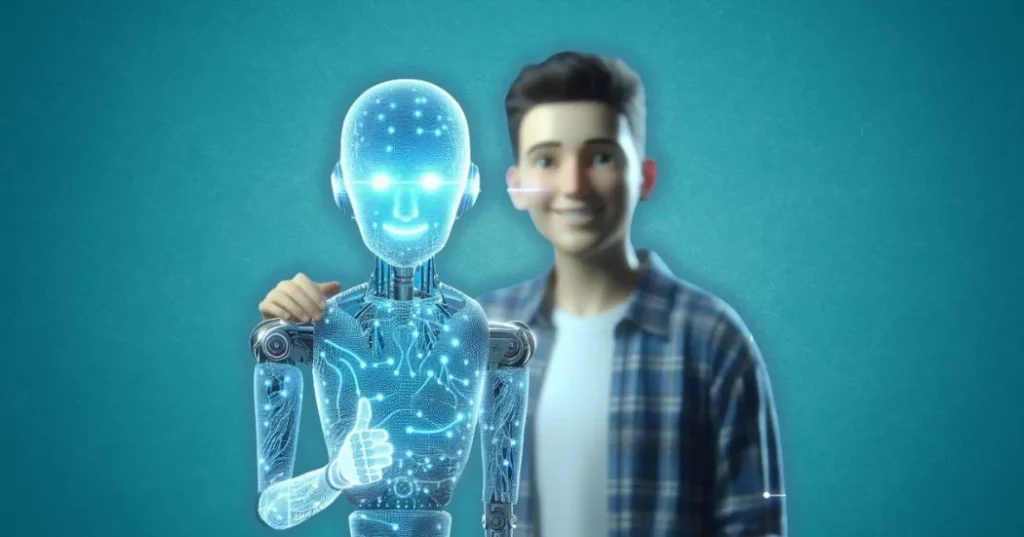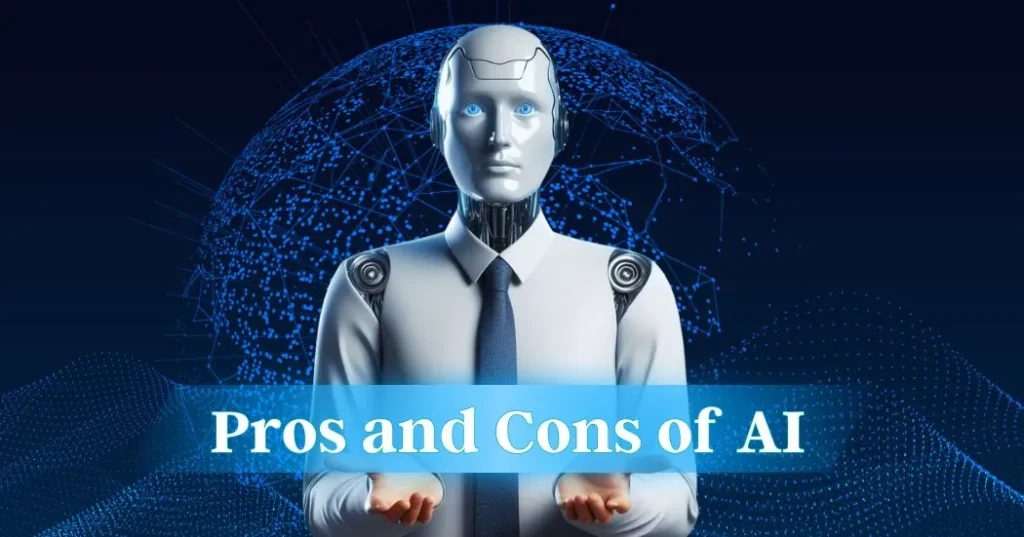Last updated on January 12th, 2024 at 09:06 am
Gone are the days when you’d have to wait for a specific time slot to catch your favorite TV show. I recall when missing just one episode meant feeling left out and disconnected from an ongoing plot. Thanks to Artificial Intelligence (AI), the world of television has taken a giant leap. Now, you can not only catch up on any missed episode, but AI also recommends movies and shows based on your interests – that’s just simply amazing, right?
As you can see, AI has become a huge part of our everyday lives – touching areas like healthcare, finding directions, choosing nearby restaurants, and even influencing our jobs. From morning to night, this unseen smart technology affects what we do
But with the continuous integration of AI into our daily lives, a notable question comes to mind – is AI a force for good or a hidden threat? This topic will be the centerpiece of our discussion. We’ll probe both sides of the argument, exploring the advantages and disadvantages of AI. We will assess the evidence to develop a balanced perspective on this technological wonder that is altering our world.
Advantages of AI: Impacting Our Brain, Body, and Soul

AI for the Brain
Personalized learning is one of the most remarkable contributions of AI. These adaptive platforms are built to identify what the learner needs, adjust instruction in response, and offer individualized learning pathways that meet each one’s particular strengths and weaknesses.
An excellent example of this is how AI has empowered non-verbal individuals, including those with autism spectrum disorder, to communicate. Natural Language Processing (NLP), an AI app, translates complex ideas into simple language. This tool has allowed people with such disorders to communicate themselves more effectively and understandably, creating a deeper connection with those around them.
AI for the Body
The healthcare sector has equally benefited from AI technology. Organizations are now using AI’s features to enhance efficiency in numerous processes – from patient care to administrative duties. AI tools assist in minimizing dose errors, streamlining workflows, and even acting as virtual nursing assistants.
AI’s potential in healthcare ranges from early disease detection to robotic surgery assistance, increasing the scope and effectiveness of patient care. This was graphically shown in an article on Futurism, where a Japanese woman’s life ended up being saved by an AI-powered medical diagnosis. Once conventional methods did not help, AI came to the rescue with an appropriate and right-on-time diagnosis that saved the day.
AI for the Soul
The creative landscape is not exempt from AI’s touch. AI applications are now being used to compose music, generate art, and even help overcome writer’s block. Apps leveraging AI can significantly boost creativity and inspiration. Whether you’re interested in writing a captivating piece or composing a musical masterpiece, there’s an app powered by AI waiting to help.
Based on my experience, AI tools have greatly contributed to enhancing my creative process and speed. When writer’s block strikes, AI serves as a valuable ally, aiding in content creation, from simple captions to comprehensive blogs – more quickly than ever.
Disadvantages of AI: Recognizing the Challenges and Striving for Balance

Job Displacement
AI causing job displacement is a major concern. With the automation of routine tasks by AI systems, certain jobs may become obsolete, resulting in unemployment for workers. However, it is important to acknowledge that AI not only replaces tasks but also generates new job prospects. The demand for AI specialists, data scientists, and machine learning engineers is steadily increasing.
An inspiring example can be found in this interview with a former sales rep who successfully transitioned to be a data scientist, serving as an inspiration to others.
Bias and Discrimination
AI algorithms inherit the biases of the data they are trained on and the people who develop them. Consequently, there is a risk that these biases may be perpetuated if AI systems are not meticulously designed and monitored. To address this issue, it is crucial to develop AI systems that not only minimize negative consequences but also are seamlessly and safely integrated into our daily lives.
There have been significant efforts made to address bias by utilizing diverse datasets and incorporating ethical frameworks to govern algorithmic decision-making. Although it may be impossible to completely eradicate bias, the reduction of undesired bias is of utmost importance in the pursuit of enhancing AI systems. By emphasizing the most concerning forms of bias, we can aim for the creation of fairer and more impartial AI systems.
Loss of Control and Privacy
AI poses privacy concerns for individuals and organizations, primarily because of the intricate algorithms employed in AI systems. A significant issue revolves around the possible misuse of AI. The collection of extensive personal information by AI systems raises concerns, as any unauthorized access to this data can lead to malicious activities, including identity theft.
To ensure privacy when using AI services, it is crucial to maintain transparency regarding the collection and utilization of data. Clear and concise information about what data is collected, how it’s used, and who has access to it is crucial. Additionally, individuals should be granted the right to access, delete, or choose not to have their data collected or used.
Striking a Balance: The Human-AI Partnership

The alliance between mankind and AI has led to remarkable progress, improved results, and enriching experiences across different fields. Even with AI’s incredible power, nothing can substitute the human touch. This collaboration combines the unique assets of humans and AI, leading to higher productivity, precise outcomes, and superior experiences.
As we continue to depend on artificial intelligence in our everyday lives, it’s essential to make sure that we use this technology in an ethical manner. To develop trust and uphold the credibility of our digital interactions, we must safeguard our data against any unauthorized access and promote transparency within AI systems.
Conclusion
We are currently living in a time of promising opportunities where Artificial Intelligence (AI) has become an integral part of our daily lives. AI has proven to be an efficient tool that helps people connect more effectively and adds a new dimension to many other sectors.
At the same time, we mustn’t forget the challenges this new tech presents. Potential job losses, ingrained biases, and privacy threats are serious issues. These problems remind us that we need to build and use AI systems in a responsible, controlled way. As we begin this year, we look forward to a future where humans and AI coexist, shaping our shared destiny positively.
To stay informed about the latest trends in AI and technology, be sure to check out our blogs. And don’t forget to become a part of our thriving community by following us on our social media channels.

